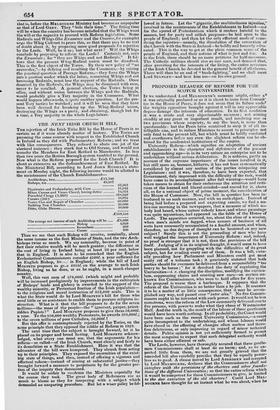THE NEXT IRISH CHURCH BILL.
THE rejection of the Irish Tithe Bill by the House of Peers is as certain as if it were already matter of history. The Tories are pursuing the same course with respect to the Established Church in Ireland as they did with Parliamentary Reform; and we trust with like consequences. They refused to abate one jot of the electoral nuisance : they stuck fast to Old Sarum, and would not transfer the Members for East Retfind to Manchester. In less than two years the Rotten Borough system tumbled to the ground. Now what is the Reform proposed for the Irish Church ? It is about as extensive as the disfranchisement of East Retford. By the Ministerial Bill, according to Lord JOHN RUSSELL'S state- ment on Monday night, the following income would be allotted to the maintenance of the Church Establishment—
Archbishops, two £17,780 Bishops, ten 49,587
The average net income of each Archbishop will be £8,890
Bishop 4,958 Incumbent 289 Curate 100
Thus we see that each Bishop will receive, nominally, about the same income as the first Minister of State, and the two Arch- bishops twice as much. We say nominally, because in point of fact their relative wealth will be much greater; the difference in the cost of living in Ireland being at least 20 per cent. below that in England. It is also to be remarked that the English Ecclesiastical Commissioners consider 4500/. a year sufficient for an English Bishop, in England; while the bill of Lord MORPETH proposes to ghe 4958/. on the average to each Irish Bishop, living as he does, or as he ought, in a much cheaper country.
Well, this vast sum of 570,000/. (which might and probably will be increased prodigiously by improvements in the cultivation of Bishops' lands and glebes) is awarded to the support of the wealthy minority, or Protestant fraction of the Irish population— to the religious and moral instruction of 852,000 souls. This is what the State would do by Lord MORPETH'S bill for those who need little or no assistance to enable them to procure religious in- struction. What is it that the bill proposes to do for the seven millions—the mass of the people—the" ignorant, pauper, priest- ridden Papists?" Lord MORPETH proposes to give them 50,000/. a year. To the 850,000 wealthy Protestants, he awards 569,000.; to the seven millions of poor Catholics, 50,0001.!
But this offer is contemptuously rejected by the Tories, on the same principle that they opposed the nibble at Reform in 1829.
The next time that the subject is brought forward, let it be placed on its proper and broad footing. Lord MORPETH acknow- ledged, what every one must see, that the arguments for his reform—so called—of the Irish Church, went clearly and fairly to its demolition as a State Establishment. Here it was that the advocates of the bill were hampered. They shrank from acting tip to their principles. They exposed the enormities of the exist- ing state of things, and then, instead of offering a vigorous and effectual reform—instead of aiming at substantial justice—they brought forward a measure to perpetuate by far the greater por- tion of the iniquity they denounced. It would be unfair to condemn the Ministers especially for the course they took. The great body of Reformers are as much to blame as they for tampering with a subject which demanded an unsparing procedure. But let a wiser policy be fol-
67,367 Dignitaries and Prebendaries, with Cure 11,042 Minor Canons and Vicars Choral, having duties 14,324 Parochial Clergy (1,250) 368,350 Curates (241) 18,075 Vestry Cm; and Repair of Churches 80,000 Building New Churches 20,000 Ditto, Glebe houses 10,000 £569,158
lowed in future. Let the " gigantic, the multitudinous injustice," involved in the maintenance of the Establishment in Ireland—not for the spread of Protestantism which it renders hateful to the masses, but for party and selfish purposes—be laid open to the people of England; and then let the only effectual mode of reme- dving the injustice—namely, the dissolution of the connexion of the Church with the State in Ireland—be boldly and honestly advo- cated. This is the way to get at the plain common sense of the people of England, and their notions of what is just and filir. As to the Irish, there should be no more petitions for half-measures. The Catholic millions should rise as one man, and demand that, after providing for the interests of the living, the entire revenues of the Irish Church be devoted to the general benefit of all classes. There will then be an end of "bush-fighting," and we shall meet Lord STANLEY—and beat him too—on his own ground.


























 Previous page
Previous page